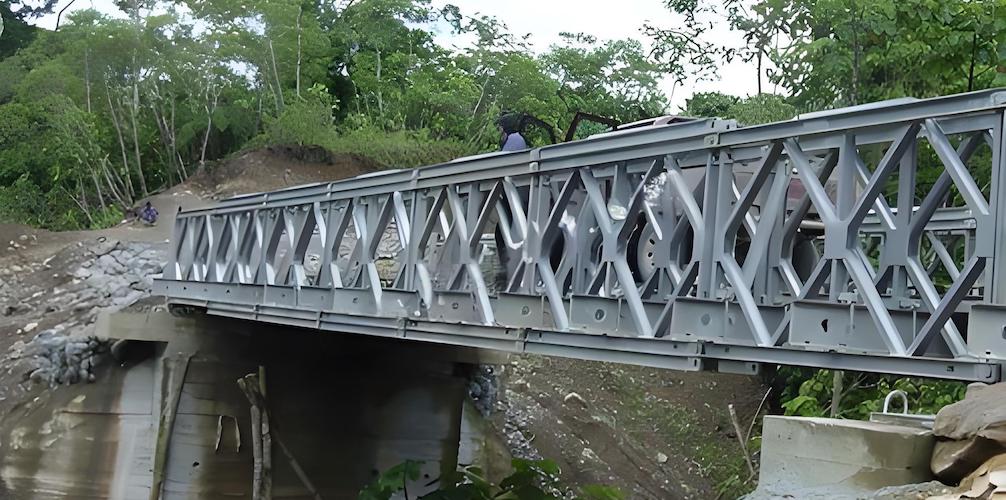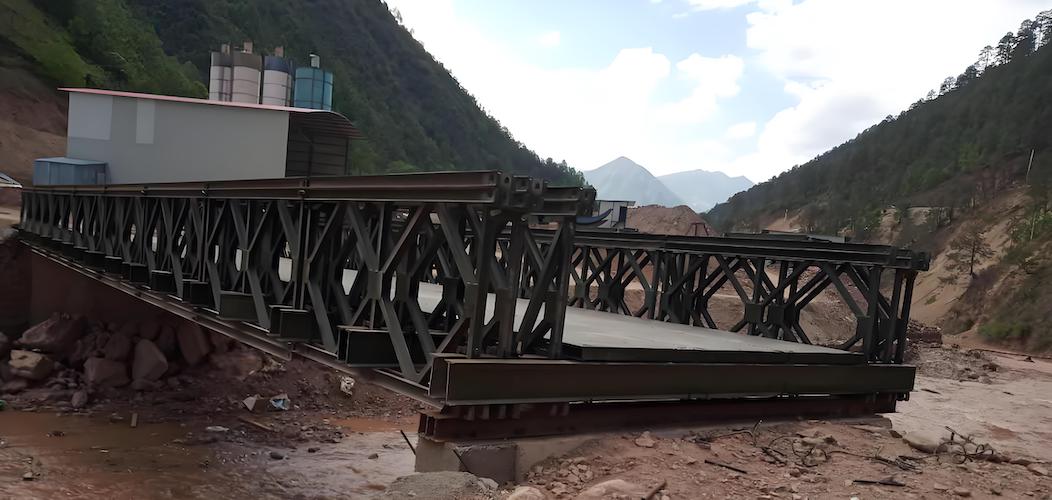Views: 211 Author: Site Editor Publish Time: 2025-11-10 Origin: Site









Content Menu
● EVERCROSS BRIDGE: A Leader in Steel Bridge Manufacturing
>> Innovations and Contributions
● Furukawa Industrial Machinery Systems Co., Ltd.
● Frequently Asked and Questions regarding Small Steel Bridge Manufacturers
>> 1. What are the typical design considerations for small steel bridges in Japan?
>> 2. How do Japanese small steel bridge manufacturers ensure seismic resilience?
>> 3. What are the latest innovations in materials used for small steel bridges in Japan?
>> 4. What role do small steel bridges play in rural infrastructure development in Japan?
>> 5. How do Japanese manufacturers address environmental concerns in bridge construction?
In the realm of infrastructure development, small steel bridges play a crucial role in enhancing connectivity and facilitating transportation. These structures are essential for various applications, including pedestrian walkways, rural access roads, and urban transit systems. Japan, known for its advanced engineering and construction capabilities, is home to several leading manufacturers specializing in small steel bridges. This article will explore the top small steel bridge manufacturers in Japan, highlighting their contributions, capabilities, and notable projects.
EVERCROSS BRIDGE stands out as one of the top manufacturers of small steel bridges in China, with a production capacity exceeding 10,000 tons annually. The company has established itself as a key player in the industry, collaborating with major enterprises such as China Communications Construction Company, China Railway Group, and China National Offshore Oil Corporation. Their expertise spans various projects, including railways, highways, and international government procurements. This extensive experience allows EVERCROSS BRIDGE to understand the unique requirements of different projects, ensuring that they deliver high-quality solutions tailored to client needs.
EVERCROSS BRIDGE is recognized for its innovative designs and commitment to quality. The company employs advanced manufacturing techniques and materials to ensure the durability and longevity of its bridges. By integrating cutting-edge software for structural analysis and utilizing modern materials, EVERCROSS BRIDGE creates bridges that are not only strong but also efficient in terms of material usage. Their innovative approach includes the use of high-strength steel and corrosion-resistant coatings, which extend the lifespan of their bridges and reduce maintenance costs over time.
Founded in 1922, Kawada Industries, Inc. has become one of Japan's foremost builders of steel bridges. With over 4,000 completed projects, the company is renowned for its expertise in designing and fabricating various types of bridges. Kawada's production capacity reaches approximately 7,000 metric tons per month, making it a significant player in the market. Their extensive portfolio includes pedestrian bridges, highway overpasses, and complex structures that require advanced engineering solutions. This breadth of experience allows Kawada to tackle projects of varying scales and complexities, from small community bridges to large infrastructure projects.
Kawada Industries offers a comprehensive range of services, including design, fabrication, and technical assistance for steel bridges. Their portfolio includes pedestrian bridges, highway overpasses, and complex structures that require advanced engineering solutions. The company is also involved in major infrastructure projects, ensuring high standards of quality and safety. Kawada's commitment to innovation is evident in their use of cutting-edge technology, such as computer-aided design (CAD) and building information modeling (BIM), which enhance the efficiency and accuracy of their construction processes. Additionally, they provide ongoing maintenance and inspection services to ensure the longevity and safety of their bridges.
Established in 1907, Yokogawa Bridge Corporation is one of Japan's oldest and most respected manufacturers of steel bridges. With production facilities in Chiba and Osaka, the company has a monthly production capacity of around 5,000 tons. Yokogawa specializes in various bridge types, including highway and railway bridges. Their long-standing presence in the industry has allowed them to build a reputation for reliability and excellence, making them a preferred partner for both public and private sector projects.
Yokogawa Bridge Corporation has played a pivotal role in constructing significant infrastructure projects across Japan and internationally. Their commitment to innovation is evident in their use of advanced technologies for bridge design and construction, ensuring efficiency and sustainability in their operations. The company has also been involved in several landmark projects, such as the construction of major expressways and rail networks, which have significantly improved transportation efficiency in the regions they serve. Furthermore, Yokogawa actively participates in research and development initiatives aimed at enhancing bridge safety and performance, particularly in seismic-prone areas.
MM&KENZAI Corporation is a leading steel trading company in Japan, supplying a wide range of structural steel products, including those used in bridge fabrication. The company is known for its innovative approach to construction and strong focus on research and development. Their extensive network of branch offices and group companies enables them to meet diverse client needs, from estimates and procurement to construction and quality control.
MM&KENZAI has successfully completed numerous projects that highlight their engineering capabilities. Their portfolio includes both urban and rural projects, demonstrating their versatility and ability to meet diverse client needs. The corporation collaborates closely with local governments and stakeholders to ensure that their projects align with community goals. This collaborative approach not only fosters positive relationships with clients but also ensures that the bridges they construct are well-integrated into the surrounding environment. Additionally, MM&KENZAI invests in training and development for its workforce, ensuring that their engineers and technicians are equipped with the latest skills and knowledge in bridge construction technologies.
Furukawa Industrial Machinery Systems Co., Ltd. leverages extensive experience and advanced technologies to deliver steel bridges that form the backbone of Japan's social infrastructure. The company specializes in constructing road bridges and highway viaducts, utilizing innovative construction methods. Their commitment to quality is reflected in their rigorous quality control processes, which ensure that every bridge meets the highest standards of safety and durability.
Furukawa has received awards for its construction projects, showcasing its commitment to quality and excellence. The company is involved in various infrastructure projects, ensuring that its bridges meet the highest standards of safety and durability. Their innovative use of materials and construction techniques allows them to create bridges that are not only functional but also aesthetically pleasing. Furthermore, Furukawa actively engages in sustainability initiatives, such as using recycled materials in their construction processes and implementing energy-efficient practices in their operations.
The small steel bridge manufacturing sector in Japan is characterized by innovation, quality, and a commitment to sustainability. Companies like EVERCROSS BRIDGE, Kawada Industries, Yokogawa Bridge Corporation, MM&KENZAI Corporation, and Furukawa Industrial Machinery Systems Co., Ltd. are at the forefront of this industry, contributing significantly to the development of essential infrastructure. Their expertise and dedication to excellence ensure that small steel bridges continue to play a vital role in enhancing connectivity and supporting economic growth in Japan and beyond. As the demand for infrastructure continues to grow, these manufacturers are well-positioned to meet the challenges of the future, leveraging their experience and technological advancements to deliver high-quality solutions.

Typical design considerations for small steel bridges in Japan include load capacity, span length, material selection, seismic resistance, and environmental impact. Engineers must ensure that the bridge can support the expected traffic loads while also being resilient to earthquakes, which are common in Japan. Additionally, the design must consider the surrounding environment to minimize ecological disruption.
Japanese manufacturers ensure seismic resilience by incorporating advanced engineering techniques and materials that enhance the flexibility and strength of the bridge structures. This includes using seismic isolation bearings, reinforced connections, and conducting thorough seismic analysis during the design phase. Regular maintenance and retrofitting of existing bridges are also crucial to maintaining their seismic performance.
Recent innovations in materials for small steel bridges include the use of high-strength steel alloys that offer improved durability and reduced weight. Additionally, manufacturers are exploring the use of composite materials that combine steel with fiber-reinforced polymers to enhance corrosion resistance and reduce maintenance needs. These advancements contribute to longer-lasting and more efficient bridge designs.
Small steel bridges are vital for rural infrastructure development in Japan as they provide essential connectivity for remote areas. They facilitate access to markets, schools, and healthcare facilities, thereby improving the quality of life for residents. Additionally, these bridges support agricultural activities by allowing farmers to transport goods more efficiently.
Japanese manufacturers address environmental concerns by implementing sustainable practices throughout the bridge construction process. This includes using recycled materials, minimizing waste, and ensuring that construction activities do not harm local ecosystems. Many companies also conduct environmental impact assessments before starting projects to identify and mitigate potential negative effects on the environment.
